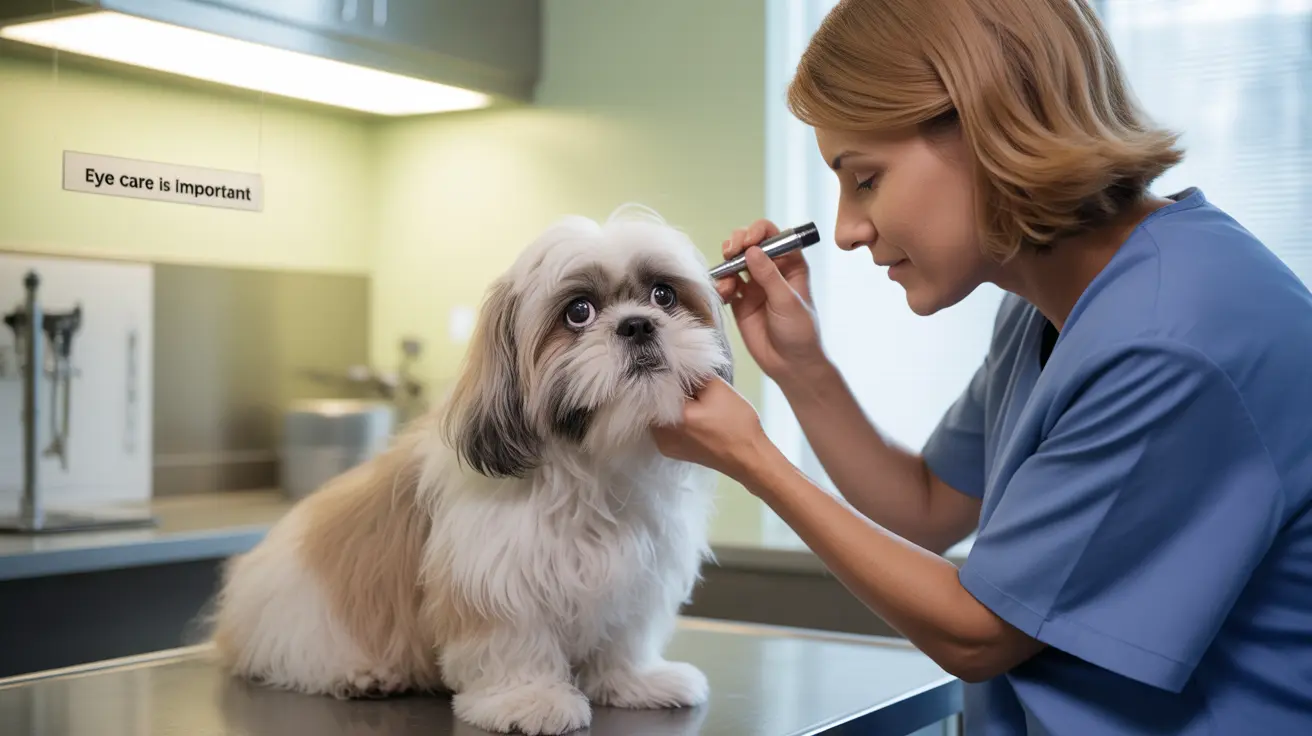Understanding Brachycephalic Eye Syndrome in Shih Tzus
The flat-faced structure of Shih Tzus makes them prone to a collection of eye issues known as brachycephalic ocular syndrome. Their protruding eyes and shallow eye sockets increase vulnerability to injuries and chronic conditions.
This anatomical predisposition means that even minor trauma can result in serious complications, making preventive care and careful handling essential for these delicate companions.
Most Common Eye Conditions in Shih Tzus
Ocular Proptosis
One of the most serious eye emergencies in Shih Tzus is ocular proptosis, where the eye becomes displaced from its socket. This condition requires immediate veterinary care to prevent permanent vision loss or blindness.
Cataracts and Lens Issues
Shih Tzus commonly develop cataracts, particularly as they age. These cloudy formations in the lens can progressively impact vision but are often treatable through surgery when caught early.
Corneal Problems
Due to their protruding eyes, Shih Tzus frequently experience corneal issues, including:
- Corneal ulcers
- Chronic keratitis
- Pigmentary keratitis
- Dry eye syndrome
Recognizing Warning Signs
Early detection is crucial for successful treatment. Watch for these symptoms:
- Excessive tearing or discharge
- Redness or inflammation
- Cloudiness in the eyes
- Squinting or frequent blinking
- Pawing at the eyes
- Changes in eye appearance or color
Prevention and Care Tips
Protecting your Shih Tzu's eyes requires consistent attention and care:
- Regular veterinary check-ups
- Gentle face cleaning with pet-safe products
- Keeping hair trimmed around the eyes
- Avoiding harsh shampoos or chemicals near the face
- Using protective eye drops as recommended by your vet
Treatment Options
Treatment approaches vary depending on the specific condition but may include:
- Topical medications
- Surgical intervention
- Systemic medications
- Lifestyle modifications
- Regular monitoring and follow-up care
Frequently Asked Questions
What are the most common eye problems that Shih Tzus experience due to their brachycephalic features?
The most common issues include corneal ulcers, dry eye syndrome, proptosis, and entropion. These conditions are directly related to their facial structure with shallow eye sockets and prominent eyes.
How can I recognize early signs of cataracts or retinal detachment in my Shih Tzu's eyes?
Watch for cloudiness in the lens (cataracts) or sudden changes in vision, including bumping into objects or hesitation when moving (retinal detachment). Any noticeable changes in eye appearance or behavior warrant immediate veterinary attention.
What should I do if my Shih Tzu's eye suddenly appears bulging or displaced (ocular proptosis)?
This is a medical emergency requiring immediate veterinary care. Keep the eye moist with sterile saline if available, avoid touching it directly, and transport your pet to an emergency veterinary facility immediately.
How are painful eyelash conditions like distichiasis or ectopic cilia treated in Shih Tzus?
Treatment typically involves surgical removal of the problematic hair follicles. While temporary solutions like plucking can provide relief, permanent surgical correction is often recommended for long-term comfort.
What preventive care and grooming tips help protect my Shih Tzu from common eye infections and injuries?
Regular cleaning around the eyes, keeping facial hair trimmed, using appropriate pet shampoos, and scheduling regular veterinary check-ups are essential preventive measures. Additionally, protect your Shih Tzu's eyes from harsh chemicals and potential trauma during grooming or play.
Conclusion
While Shih Tzus are prone to various eye problems, understanding these conditions and maintaining vigilant care can help prevent serious complications. Regular veterinary check-ups, proper hygiene, and prompt attention to any changes in your pet's eyes are key to maintaining their ocular health and overall well-being.






